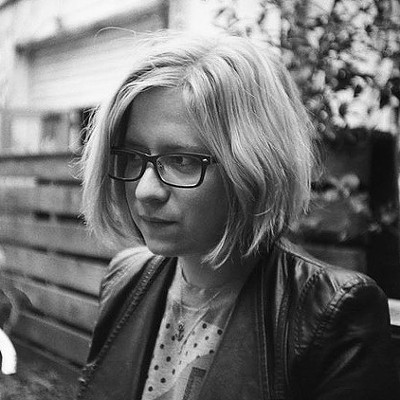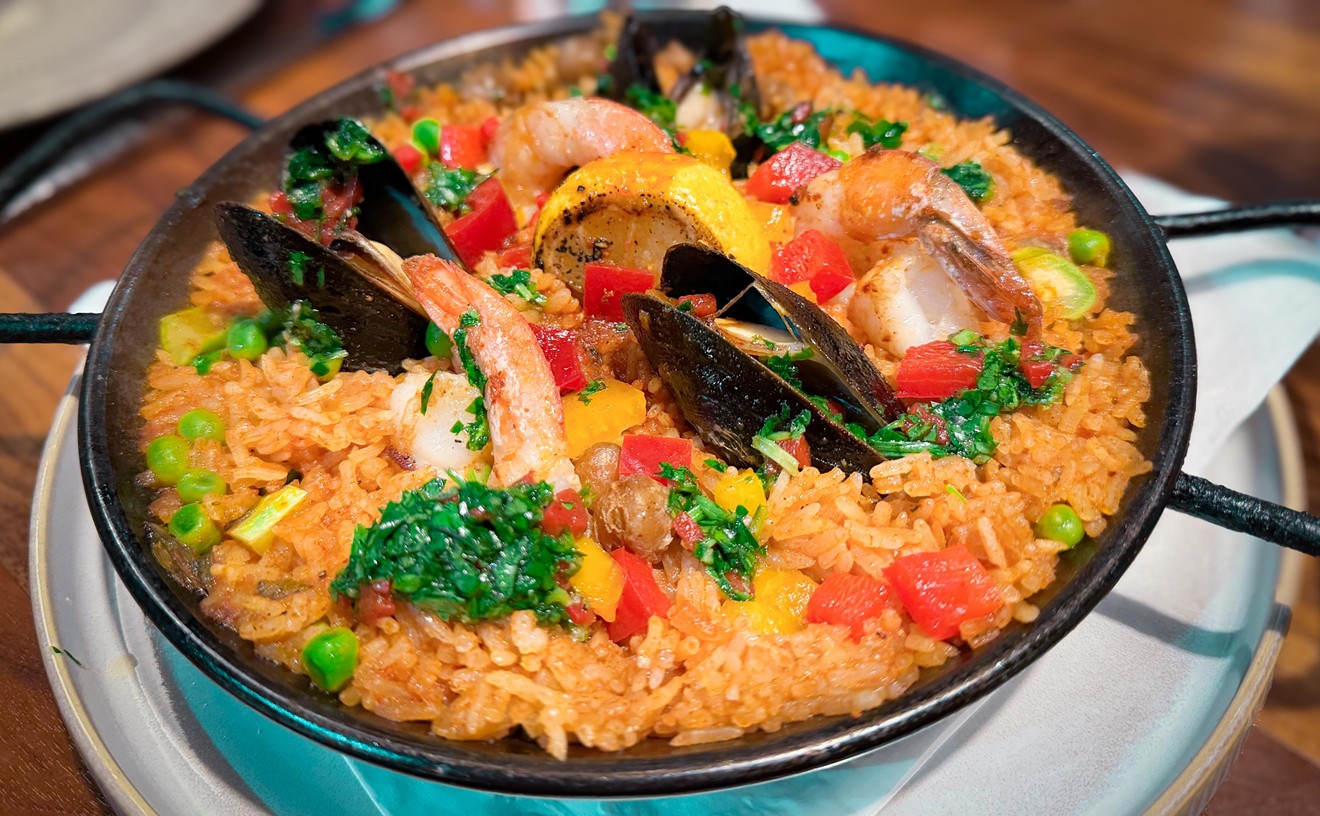As the State Fair of Texas winds down on a Friday night, visitors flood the area in front of the gates on Parry Avenue, many waiting for the next DART train. There are quite literally hundreds of people milling around a space of one or two city blocks, right across the street from businesses like Pizza Lounge and Craft and Growler.
Across the street, at Craft and Growler, the bar is suspiciously quiet — at 9 p.m. on a Friday night, prime beer-drinking hour. Had the bicycle group Critical Mass not ended its monthly ride in front of the bar, the bar would have been surprisingly slow considering the thousands of people leaving the fair just a few hundred feet away.
This, Expo Park business owners say, is how it works during the State Fair of Texas' annual month-long run.
"The fair is terrible for the businesses in the area of Expo and Parry," says Meri Dahlke, owner of Eight Bells Alehouse in Expo Park and Ten Bells Tavern in Bishop Arts. "The only decent weekend we've had was Texas/OU. Most people just visit the fair and go home — and take up all the parking."
A few hours after the Texas/OU game, four people were at Eight Bells Alehouse — at 8:30 p.m. on a Saturday night. This is pretty par for the course during the fair, Dahlke says; the bar did see a sizable crowd that came in to watch the football game, but it thinned out mighty quick once it ended.
How is it possible that having such an influx of people in the neighborhood could be a bad thing? As Expo Park business owners have learned, having thousands of people flooding an otherwise quiet area shifts the neighborhood's dynamics and uses up neighborhood resources, namely parking.
"It takes a hit primarily because all the parking is used for the fair, including the lot in back that has two rows for Expo businesses," Dahlke says. "There is literally no place to park unless you want to pay $15. Nobody wants to do that for a beer and a sandwich."
Craft and Growler on Parry Avenue opened in 2012, and owner Kevin Thibodeaux says fair month has been a struggle ever since. In 2014, he decided to close the bar entirely during the fair.
"It was so bad, we just closed for the whole month," Thibodeaux says. "That year we closed, we had such a public backlash."
Thibodeaux now keeps the bar open during the fair, but with some adjustments — Craft and Growler stops hosting events for the month, and Thibodeaux speaks frankly to his regulars about the situation.
"I tell my regulars, don't even come down here," he says. Parking spaces behind his bar, normally reserved for Expo Park businesses, become private lots charging upward of $25 per parking space, Thibodeaux says. Customers can't get to the bar easily, so they just stop coming.
As hundreds of thousands of people spend millions of dollars on admission, parking, tickets and retail at the State Fair of Texas, just across the street, businesses that live in the neighborhood year-round take a major hit. Business drops by 25 percent for the entire month, Thibodeaux and Dahlke say.
"People come in and tell me, 'Oh, you must kill it during the fair,'" Thibodeaux says. "It's certainly not the boost that everyone thinks it will be."
Shad Kvetko, co-owner of Oak Cliff Vintage near Bishop Arts, has long been searching the city for a place to open his dream venture: Las Almas Rotas, a mezcal bar. He wanted to open the bar in his Oak Cliff stomping grounds, but the neighborhood's antiquated liquor laws make that almost impossible unless he's willing to run a full kitchen, too. Recently, he saw a glimmer of light: a potential home for the mezcaleria in Expo Park. But the fact that hundreds of thousands of people flood the neighborhood one month a year is not actually a draw for him — it makes him nervous.
"I think the main concern would have to be parking," Kveto says. "I know that the parking lots that serve the businesses in the area are turned into paid parking for the duration of the fair, and I'm not sure how that impacts those businesses."
Kveto says he's not convinced that fair-goers will be interested in walking across the street to sample craft mezcal cocktails before or after the fair. But though he hasn't signed a lease yet, he's still toying with bringing Las Almas Rotas to the neighborhood.
"Perhaps, with ride sharing now so prevalent, the parking situation is less of a big deal," he says. "I suppose the hope is that with such a massive influx of people who normally don't frequent the area, you can gain new customers."
Thibodeaux and Dahlke say they try their best to be good sports about the fair. Craft and Growler now sells discounted fair tickets ($13, down from $18) and tries to pull in new customers. But a lot of the people walking through his door have no intention of buying a beer, he says — instead, they use his bathroom. The owner of Pizza Lounge recently posted on Facebook about "yet another plugged toilet compliments of the State Fair."
What could solve this problem? Letting the businesses keep their parking would help, owners say. Thibodeaux also thinks the fair could do a better job of integrating the businesses around Fair Park into the fair experience. But in the end, what could have been a great thing for these businesses has proven to instead lead to significantly decreased sales.
"We were warned about that by the locals and other business owners," Dahlke says. "I think a huge help would be to give up part of the back parking lot to the businesses on Expo and Parry. That's hard to do when whoever owns the lot is getting $15 a pop per car, though."
Karissa Condoianis, vice president of public relations for the State Fair of Texas, says she hasn't heard complaints from businesses that lose revenue during fair month but is willing to talk to business owners about the fair's impact on the neighborhood. There's little that can be done, however, about a building owner turning otherwise free parking into paid parking.
"As the fair continues to flourish, we definitely want to help support the businesses that are around the fair because we want what's best for Fair Park," she says.
This year, the fair switched to a new ticketing system that should help the fair get a better grasp of just how many people attend the fair during its month-long run, she says. She was unable to provide any estimates for this season's attendance, but says she believes that some fair-goers do patronize Expo Park businesses, particularly as the fair winds down for the day. Parking aside, Condoianis says she's willing to talk to fair management about ways to integrate Expo Park businesses, perhaps by giving them vendor spaces at the fair or using targeted marketing.
"Maybe there's something we can look at to see how we can help them in some way gain more exposure," she says. "I think it's just looking at how we can be innovative and work together and see how we can all support each other."
[
{
"name": "Air - MediumRectangle - Inline Content - Mobile Display Size",
"component": "18855504",
"insertPoint": "2",
"requiredCountToDisplay": "2"
},{
"name": "Editor Picks",
"component": "17105533",
"insertPoint": "4",
"requiredCountToDisplay": "1"
},{
"name": "Inline Links",
"component": "18349797",
"insertPoint": "8th",
"startingPoint": 8,
"requiredCountToDisplay": "7",
"maxInsertions": 25
},{
"name": "Air - MediumRectangle - Combo - Inline Content",
"component": "17105532",
"insertPoint": "8th",
"startingPoint": 8,
"requiredCountToDisplay": "7",
"maxInsertions": 25
},{
"name": "Inline Links",
"component": "18349797",
"insertPoint": "8th",
"startingPoint": 12,
"requiredCountToDisplay": "11",
"maxInsertions": 25
},{
"name": "Air - Leaderboard Tower - Combo - Inline Content",
"component": "17105535",
"insertPoint": "8th",
"startingPoint": 12,
"requiredCountToDisplay": "11",
"maxInsertions": 25
}
]











